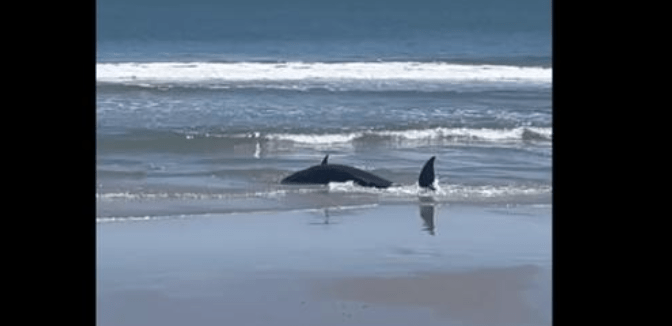A baby whale became beached off of Myrtle Beach State Park this afternoon.
The pygmy sperm whale died on Myrtle Beach near Pirateland. It was alive for awhile on the beach but died shortly after.
The whale is estimated to weigh 300 pounds. Horry County Beach Patrol arrived around 12:30 p.m. after receiving a call about the beached whale.
A marine biologist from Charleston is on the way to investigate.
Charleston later reported:
The Lowcountry Marine Mammal Network (LMMN) necropsied the animal on Friday, May 5th. This was determined to be a 8.5 ft male Pygmy sperm whale. The animal was in poor health including gastric ulcers, hemorrhagic lungs and rock hard stool indicating this animal likely stranded due to its poor health status. Additional samples were taken including histology which may take 6-8 weeks for results which will help identify a more definitive cause of death. LMMN is the permit holder for all marine mammal (dolphins and whales) strandings in SC and should be contacted for future strandings. [email protected]. Kogia sp. (dwarf and pygmy sperm whales) are the second most commonly stranded marine mammal in the southeast region of the U.S. (U.S. Atlantic coast from Florida through North Carolina, Gulf of Mexico, Puerto Rico, and the U.S. Virgin Islands). Kogia sp. are the most common live stranding in the Southeast. All marine mammals are federally protected by the Marine Mammal Protection Act (MMPA). Only those authorized under the MMPA may legally handle live and dead marine mammals.
Don’t push live stranded marine mammals back! Dolphins and other marine mammals strand when they are sick or injured. Pushing a marine mammal back into the water delays assessment and treatment from trained responders and can lead to further injury, suffering, and eventual death. If you see a stranded animal, follow these three steps to help:
STOP: Don’t push them back!
 CALL: 1-877-WHALEHELP (942-5343) 24-hr Southeast stranding hotline
CALL: 1-877-WHALEHELP (942-5343) 24-hr Southeast stranding hotline
Understanding Why Whales Beach
Before discussing the response to the beached whale at Myrtle Beach State Park, it is important to understand why whales beach in the first place. There are several reasons why whales may beach themselves, including illness, injury, disorientation, and navigational errors. When whales get sick they typically come to shore. In some cases, a whale may beach itself due to the presence of predators or human activity, such as noise pollution from boats.
It is important to note that beached whales are not a new phenomenon. In fact, whales have been beaching themselves for millions of years. However, with the increase in human activity and the impact of climate change, incidents of beached whales have become more common in recent years.
The Response of Local Authorities to the Beached Whale
Upon receiving reports of a beached whale at Myrtle Beach State Park, local authorities immediately sprang into action. The first step in the response was to assess the condition of the whale and determine the best course of action.
The next step was to assemble a team of experts, including marine biologists, veterinarians, and rescue workers, to assist with the rescue.
This is a developing story.


